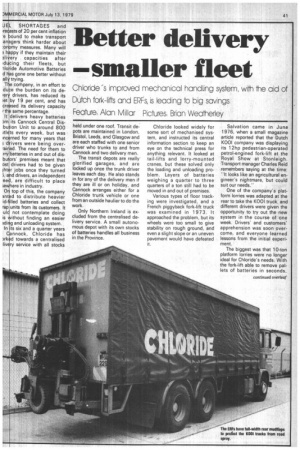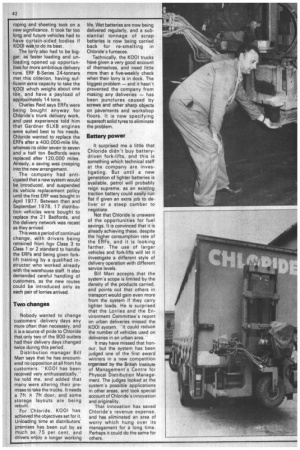Better delivery smaller fleet
Page 43

Page 44

If you've noticed an error in this article please click here to report it so we can fix it.
Chloride's improved mechanical handling system, wi e aid of
Dutch fork-iifts and ERFs, is leading to big savings Feature, Alan V illar Pictures, Brian Weclherley JEL SHORTAGES and ,re asts of 20 per cent inflation :e sound to make transport an gers think harder about ;on my measures. Many will h ppy if they maintain their 31i ery capacities after 'cl cing their fleets, but lo ide Automotive Batteries d as gone one better without all trying.
T e company, in an effort to du e the burden on its deer drivers, has reduced its 3et by 19 per cent, and has Cr-sed its delivery capacity th same percentage.
It delivers heavy batteries )m its Cannock Central Disbu ion Unit to around 800
ts every week, but was ,nc rned for many years that ; d ivers were being over-ai ed. The need for them to rry batteries in and out of disbu ors' premises meant that ost drivers had to be given iht r jobs once they turned 5, a d drivers, an independent ee , are difficult to place ;e here in industry.
0 top of this, the company 3nt d to distribute heavier idilled batteries and collect rap units from its customers. It ul not contemplate doing is ithout finding an easier )di g and unloading system. In its six and a quarter years annock, Chloride has )rk d towards a centralised liv ry service with all stocks held under one roof. Transit depots are maintained in London, Bristol, Leeds, and Glasgow and are each staffed with one senior driver who trunks to and from Cannock and two delivery men.
The transit depots are really glorified garages, and are locked up once the trunk driver leaves each day. He also stands in for any of the delivery men if they are ill or on holiday, and Cannock arranges either for a Chloride trunk vehicle or one from an outside haulier to do the work.
Only Northern Ireland is excluded from the centralised delivery service. A small autonomous depot with its own stocks of batteries handles all business in the Province. Chloride looked widely for some sort of mechanised system, and instructed its central information section to keep an eye on the technical press for anything relevant. It looked at tail-lifts and lorry-mounted cranes, but these solved only the loading and unloading problem. Layers of batteries weighing a quarter to three quarters of a ton still had to be moved in and out of premises.
Various types of floor tracking were investigated, and a French piggyback fork-lift truck was examined in 1973. It approached the problem, but its wheels were too small to give stability on rough ground, and even a slight slope or an uneven pavement would have defeated it.
Salvation came in June 1976, when a small magazine article reported that the Dutch K001 company was displaying its 12hp pedestrian-operated petrol-engined fork-lift at the Royal Show at Stonleigh. Transport manager Charles Reid remembers saying at the time: "It looks like an agricultural engineer's nightmare, but could suit our needs."
One of the company's platform lorries was adapted at the rear to take the K001 truck, and different drivers were given the opportunity to try out the new system in the course of one week. Drivers' and customers' apprehension was soon overcome, and everyone learned lessons from the initial experiment.
The biggest was that 10-ton platform lorries were no longer ideal for Chloride's needs. With the fork-lift able to remove pallets of batteries in seconds,
roping and sheeting took on a new significance. It took far too long and future vehicles had to have curtain-sided, bodies if K001 was to do its best .
The lorry also had to be bigger, as faster loading and unloading opened up opportunities for more ambitious delivery runs. ERF B-Series 24-tonners met this criterion, having sufficient extra capacity to take the K001 which weighs about one ton, and have a payload of approximately 14 tons.
Charles Reid says ERFs were being bought anyway for Chloride's trunk delivery work, and past experience told him that Gardner 6LXB engines were suited best to his needs. Chloride wanted to replace the ERFs after a 400,000-mile life, whereas its older seven to seven and a half ton Bedfords were replaced after 120,000 miles. Already, a saving was creeping into the new arrangement.
The company had anti.cipated that a new system would be introduced, and suspended its vehicle replacement policy until the first ER F was bought in April 1977. Between then and September 1978, 17 distribution vehicles were bought to replace the 21 Bedfords, and the delivery network was recast as they arrived.
This was a period of continual change, with drivers being retrained from hgv Class 3 to Class 1 or 2 standard to handle the ERFs and being given forklift training by a qualified instructor who worked already with the warehouse staff. It also demanded careful handling of customers, as the new routes could be introduced only as each pair of lorries arrived.
Two changes
Nobody wanted to change customers' delivery days any more often than necessary, and it is a source of pride to Chloride that only two of the 800 outlets had their delivery days changed twice during this period.
Distribution manager Bill Marr says that he has encountered no opposition at all from his customers. "KO 01 has been received very enthusiastically," he told me, and added that many were altering their premises to take the trucks. It needs a 7ft x 7ft door, and some storage layouts are being rebuilt.
For Chloride, KO 01 has achieved the objectives set for it. Unloading time at distributors' premises has been cut by as much as 75 per cent, and drivers enjoy a longer working life. Wet batteries are now being delivered regularly, and a substantial tonnage of scrap batteries is now being carried back for re-smelting in Chloride's furnaces.
Technically, the K001 trucks have given a very good account of themselves, and need little more than a five-weekly check when their lorry is in dock. The biggest problem — and it hasn't prevented the company from making any deliveries — has been punctures caused by screws and other sharp objects on pavements and workshop floors. It is now specifying supersoft solid tyres to eliminate the problem.
Battery power
It surprised me a little that Chloride didn't buy batterydriven fork-lifts, and this is something which technical staff at the company are investigating. But until a new generation of lighter batteries is available, petrol will probably reign supreme, as an existing traction battery could easily run flat if given an extra job to deliver or a steep camber to negotiate.
Not that Chloride is unaware of the opportunities for fuel savings. It is convinced that it is already achieving these, despite the higher consumption rate of the ERFs, and it is looking farther. The use of larger vehicles and fork-lifts will let it investigate a different style of delivery operation with different service levels.
Bill Marr accepts that the system's scope is limited by.the density of the products carried, and points out that others in transport would gain even more from the system if they carry lighter loads. He is surprised that the Lorries and the Environment Committee's report on urban deliveries missed the K001 system. "It could reduce the number of vehicles used on deliveries in an urban area."
It may have missed that honour, but the system has been judged one of the first award winners in a new competition organised by the British Institute of Management's Centre for Physical Distribution Management. The judges looked at the system's possible applications in other areas, and took special account of Chloride's innovation and originality.
That innovation has saved Chloride's revenue expense, and has eliminated an area of worry which hung over its management for a long time. Perhaps it could do the same for others.








































































































































